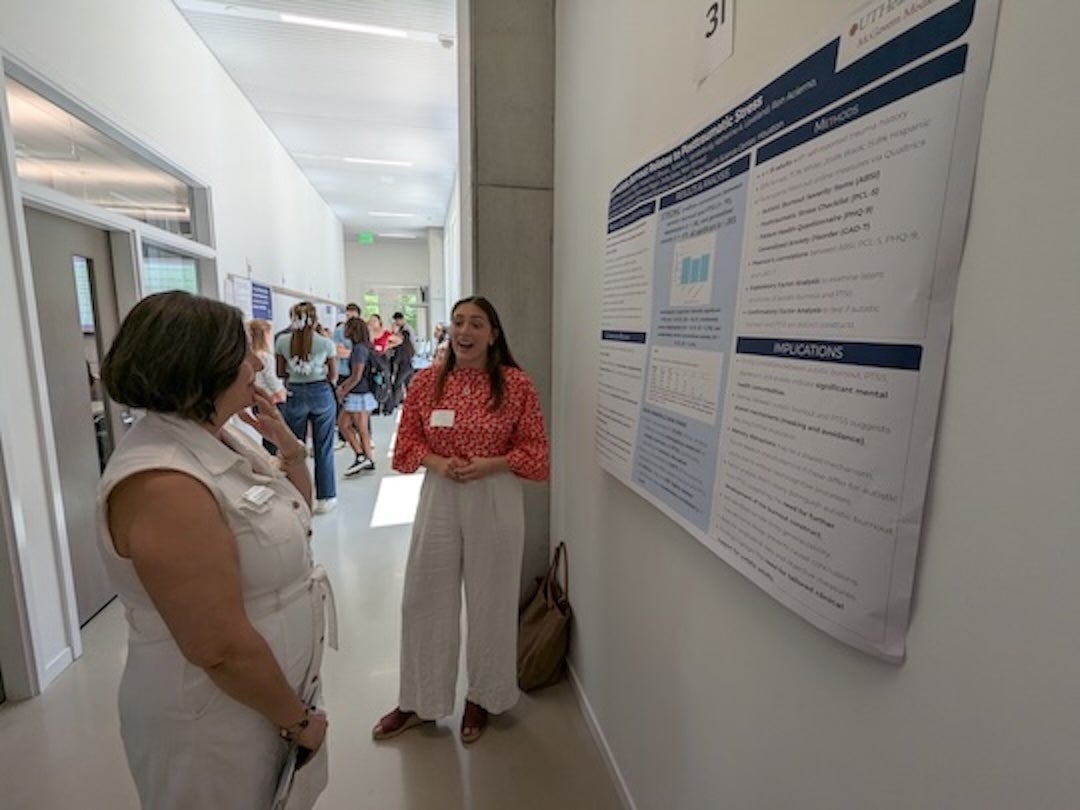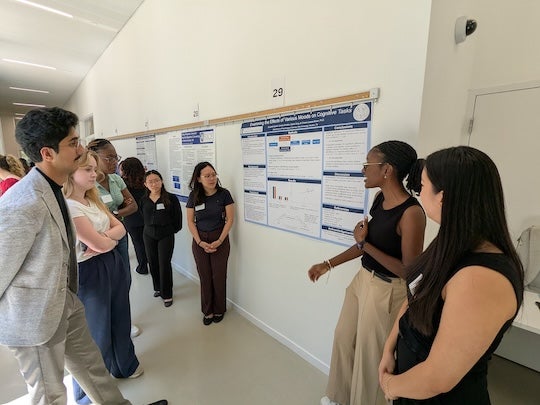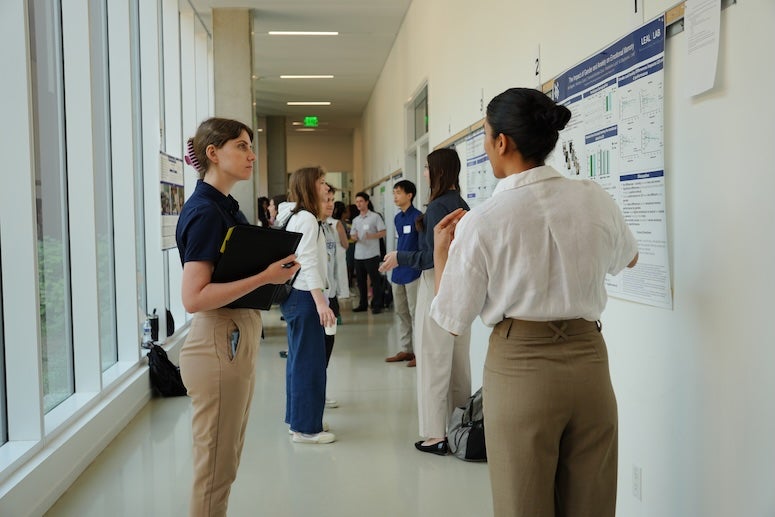
Kraft Hall was buzzing with energy — and packed wall to wall — as Rice University undergraduates transformed its corridors into a vibrant showcase of original research and creative exploration during the 2025 Social Sciences Undergraduate Research and Creative Symposium last semester.
Posters lined the walls as students shared their work with anyone who stopped to ask. With presentations happening all at once and the hallways packed with curious onlookers, Kraft Hall took on the feel of a pop-up research festival — energetic, informal and full of ideas in motion.
But beyond the hustle and buzz was something more meaningful: students asking big questions about the world around them — and using research to find answers. Many of this year’s projects explored topics that felt personal, from anxiety and emotional memory to cultural identity, productivity and financial stress.
“The School of Social Sciences and its faculty are dedicated to fostering curiosity, teaching innovative research methods and instilling valuable problem-solving skills in undergraduate students,” said Rachel Kimbro, dean of the School of Social Sciences. “As demonstrated at this year’s SSURS, our undergraduate students are conducting exceptional research that has the potential to make a real impact in the world.”
One of those students was Ahi Ajayan, whose poster earned the event’s top honor. Her research looked at how gender and anxiety levels influence emotional memory.
“Emotion plays such a big role in our lives and has a huge impact on our memory and cognition,” said Ajayan, a member of the Neuroscience of Memory, Mood and Aging Lab. “I was interested in the intersection of gender, anxiety, and emotional memory because I think the three concepts are interrelated and need to be researched further.”

She said presenting her work was both exciting and humbling.
“It was wonderful to see the effort and work come to fruition and be alongside so many amazing projects,” she said. “Not only was it enriching to present my work, but also to walk around and hear about all the exciting research that my classmates were doing. Winning the top poster award was an unexpected but amazing surprise.”
Graduate student Fernanda Morales-Calva, who mentored undergraduate Giselle Rodriguez-Chavez on a project exploring Alzheimer’s disease in Latino populations, echoed that the power of this event is in how it centers real-life experience. Their research disaggregated Latino populations by region and cultural background to better understand how stress and acculturation affect memory.
“Latinos are severely underrepresented in aging and dementia research despite their higher likelihood of developing Alzheimer’s,” Morales-Calva said. “Our research aims to reduce health disparities by making cognitive testing more culturally relevant and accessible.”
She added that their findings highlight the importance of avoiding broad generalizations. “Latinos living in Latin America performed similarly to non-Latinos. It was U.S.-based Latinos — both U.S. born and foreign born — who showed lower memory performance, likely due to stress and acculturation.”
Hosted by the School of Social Sciences and supported by the Moody Gateway Program, the symposium gives students a platform to present their work publicly, receive feedback from faculty and peers, and sharpen their ability to explain complex ideas clearly — all while building community across departments.
2025 SSURS Award Winners
POSTERS
-
Best Poster – Research Methods: Giselle Rodriguez-Chavez and Fernanda Morales-Calva, “Stress Across Cultures: The Cognitive Cost in the Latinx Community”
-
Best Poster – Research Findings: Nicolas Lucio, “Exploring Predictors of Health Perception: A Statistical Analysis of Behavioral, Psychological and Socioeconomic Factors”
-
Best Poster – Visualization/Presentation:
-
Isabella Gonzalez, “Examining Factors Impacting Educational Attainment”
-
Alexandra Xu and Ellie Jung, “Here’s Some Advice, Check It Twice: Exploring Two-Fold Intervention to Motivate Ballot Error Detection”
-
-
Best Overall Poster: Ahi Ajayan, “Assessing the Impact of Gender and Anxiety Levels on Emotional Memory”
ORAL PRESENTATIONS
-
Best Methodological Approach: Somya Mittal, “Understanding Sarcasm Requires Theory of Mind after Acute Stroke” and Abhinav Kona, “A Cognitively Inspired Unsupervised Model for Language Segmentation”
-
Best Research Findings: Jacob Buergler, “Differential Affective and Cognitive Effects of Cognitive Reappraisal Strategies”
-
Best Overall Presentation: Andrew Kim, “Veneration vs. Respect: Reevaluating Public Aversion to Amending the U.S. Constitution”

